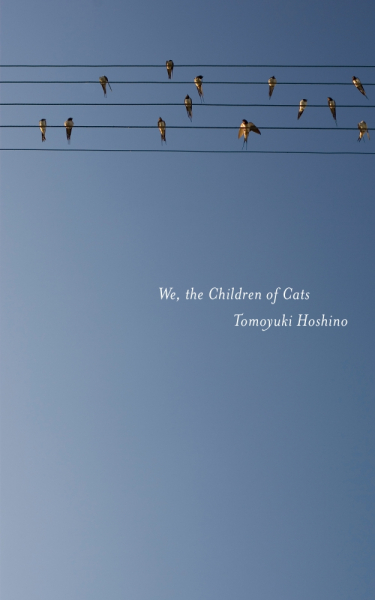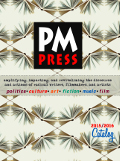We, the Children of Cats
Author: Tomoyuki Hoshino • Translated by Brian Bergstrom
Publisher: PM Press/Found in Translation
ISBN: 9781604865912
Published: 8/2012
Format: Paperback
Size: 5 x 8
Page count: 288
Subjects: Fiction/Literary Collection
A man and woman find their genders and sexualities brought radically into question when their bodies sprout new parts, seemingly out of thin air…. A man travels from Japan to Latin America in search of revolutionary purpose and finds much more than he bargains for…. A journalist investigates a poisoning at an elementary school and gets lost in an underworld of buried crimes, secret societies, and haunted forests…. Two young killers, exiled from Japan, find a new beginning as resistance fighters in Peru….
These are but a few of the stories told in We, the Children of Cats, a new collection of provocative early works by Tomoyuki Hoshino, winner of the 2011 Kenzaburo Oe Award in Literature and author of the powerhouse novel Lonely Hearts Killer (PM Press, 2009). Drawing on sources as diverse as Borges, Nabokov, Garcia-Marquez, Kenji Nakagami and traditional Japanese folklore, Hoshino creates a challenging, slyly subversive literary world all his own. By turns teasing and terrifying, laconic and luminous, the stories in this anthology demonstrate Hoshino’s view of literature as “an art that wavers, like a heat shimmer, between joy at the prospect of becoming something else and despair at knowing that such a transformation is ultimately impossible…a novel’s words trace the pattern of scars left by the struggle between these two feelings.” Blending an uncompromising ethical vision with exuberant, freewheeling imagery and bracing formal experimentation, the five short stories and three novellas included in We, the Children of Cats show the full range and force of Hoshino’s imagination; the anthology also includes an afterword by translator and editor Brian Bergstrom and a new preface by Hoshino himself.
Praise:
“The loosely linked stories collected in We, the Children of Cats home in on everyday events of millennial Japan only to slowly pan out onto alternate realities—voyages, crimes of passion, cultural histories of treason, sudden quarrels and equally sudden truces. Bergstrom and Fraser’s translations brilliantly capture the emotional tones and shape-shifting nature of Hoshino’s language. These stories explore the longing to be somewhere, sometime, or even someone else so strongly that reality itself is, before you know it, transfigured.”
—Anne McKnight, Terasaki Center for Japanese Studies at UCLA, author of Nakagami, Japan: Buraku and the Writing of Ethnicity
“I see [in Hoshino] an ability to truly think through fiction that recalls Kobo Abe. This superlative ability makes even the most fantastical details and developments read as perfectly natural.”
—Kenzaburō Oe, Nobel Prize winning author of Nip the Buds, Shoot the Kids and Teach Us To Outgrow Our Madness
“These wonderful stories make you laugh and cry, but mostly they astonish, co-mingling daily reality with the envelope pushed to the max and the interstice of the hard edges of life with the profoundly gentle ones.”
—Helen Mitsios, editor of New Japanese Voices: The Best Contemporary Fiction from Japan and Digital Geishas and Talking Frogs: The Best 21st Century Short Stories from Japan
“Like a heat shimmer on a summer’s day, Hoshino Tomoyuki’s stories tantalize and haunt. From ‘Paper Woman’ to ‘A Milonga for the Melted Moon,’ Hoshino writes of people stranded between poles of reality and dream—with each option as uncertain as the other. Wonderfully translated, selected, and presented, this collection of works will be required reading.”
—Rebecca Copeland, Washington University in St. Louis, author of Lost Leaves: Women Writers of Meiji Japan and translator of Grotesque by Natsuo Kirino
“What feels most striking and praiseworthy about Hoshino’s work is how he deals with ambiguity—not as a fusion of multiple meanings, nor as their simple coexistence, nor as symbolic of meaning’s absence; rather, he deftly weaves these concepts together and then, in the space between them, makes his escape.”
—Maki Kashimada, award-winning author of Love at 6000° and The Kingdom of Zero
About Tomoyuki Hoshino:
Born in Los Angeles in 1965, Tomoyuki Hoshino returned to Japan with his family before his third birthday and spent the next twenty-three years living in the greater Tokyo-Yokohama area. After graduating with a degree in literature from Waseda University in 1988, he worked for two years as a journalist for the conservative Sankei newspaper. He left that job and Japan to study abroad in Mexico from 1991–92. After briefly returning to Japan, he received a Mexican government scholarship and resumed his studies in Mexico, where he stayed until August of 1995. From 1996–2000, he tried his hand at writing subtitles for Latin American and Spanish films.
His debut novel The Last Gasp was published in 1997 and awarded the Bungei Prize. His second novel Open Your Eyes, the Mermaids Sing Fantasista, a collection of three novellas (including “Sand Planet”). His other book-length works include Naburiai (1999), The Poisoned Singles Hot Springs (2002), Lonely Hearts Killer (2004; pub. in English by PM Press, 2009), Alkaloid Lovers (2005), A Worussian-Japanese Tragedy (2005), The Tale of Rainbow and Chloe (2006), The Examination Room for Plants (2007), Mugendō (2007), Suizoku (2009), and OreOre (2010), which won the 2011 Kenzaburō Oe Award for Literature.
About Brian Bergstrom (translation):
Brian Bergstrom is a PhD candidate in East Asian languages and civilizations at the University of Chicago and a Sessional Lecturer at McGill University in Montréal. He is completing a dissertation examining representations of youthful criminals in Japanese literature and popular culture. In addition to his work with Hoshino, he has published articles on the proletarian woman writer Takako Nakamoto and the contemporary Gothic Lolita novelist Novala Takemoto.
About Lucy Fraser (translation):
Lucy Fraser is a PhD candidate at The University of Queensland, Australia, researching gender and fairy tale revisions in contemporary Japanese and English texts. Her other translations include an interview with shōjo manga writer Sakumi Yoshino, literary criticism by Masuko Honda and Kenko Kawasaki, song lyrics, and literary news.
See and hear author interviews, book reviews, and other news on Tomoyuki Hoshino's page HERE
Cart Contents
Recent Posts





